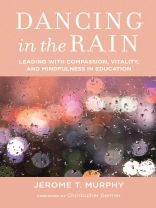Dancing in the Rain offers a lively and accessible guide aimed at helping education leaders thrive under pressure by developing the inner strengths of mindfulness and self-compassion, expressing emotions wisely, and maintaining a clear focus on the values that matter most. Jerome T. Murphy, a scholar and former dean who has written and taught about the inner life of education leaders, argues that the main barrier to thriving as leaders is not the outside pressures we face, but how we respond to them inside our minds and hearts.
In this concise volume, Murphy draws on a combination of Eastern contemplative traditions and Western psychology, as well as his own experience and research in the field of education leadership. He presents a series of exercises and activities to help educators take discomfort more in stride, savor the joys and satisfactions of leadership work, and thrive as effective leaders guided by heartfelt values.
Every day, education leaders find themselves swamped in a maelstrom of pressures that add to the complex challenges of educating all students to a high level. With humor and compassion,
Dancing in the Rain shows educators how to lead lives of consequence and purpose in the face of life’s inescapable downpours.
लेखक के बारे में
Jerome T. Murphy is the Harold Howe II Professor of Education Emeritus and Dean Emeritus at the Harvard Graduate School of Education. His current teaching and research focuses on the inner life of education leaders and how to find meaning and vitality in the midst of stress and strain.
A graduate of Columbia College and Columbia Teachers College and coming from a family of proud teachers, Murphy started his career with two rewarding years as a public school math teacher. He then unexpectedly got a job working for the federal government as part of the War on Poverty. He was part of a team that helped develop the Elementary and Secondary Education Act of 1965, and he later spent an unforgettable year as the Associate Director of the White House Fellows Program and the Associate Staff Director of the National Advisory Council on the Education of Disadvantaged Children. During these heady days in Washington, his eyes were opened to the nuances of leadership as he observed up close how political leaders and dedicated civil servants actually engage in principled politics in the pursuit of noble ends.
Shortly after Richard Nixon was elected president, Murphy moved on to become a doctoral student at the Harvard Graduate School of Education and has been there ever since, but for a delightful two years as a Visiting Professor at the Penn Graduate School of Education.
Drawing on his seven years in public schooling and government service, Murphy turned his attention to studying and writing about the everyday reality of how things actually work in education. He became a specialist in the politics of education, with a focus on government policy, program implementation and evaluation, organizational leadership, and qualitative methodology.
Murphy conducted some of the earliest studies of the implementation of the Great Society education programs and the role of the states in educational policy and governance; he contributed to novel data-collection techniques in educational evaluation. Along the way, he has written books and articles about these topics as well as about schools of education, about the lives of education leaders, and about the changing roles of school superintendents and chief state school officers. Murphy has also examined educational policy and practices in Australia, China, Colombia, England, Japan, and South Africa and has given presentations at research meetings in Denmark, Israel, Norway, Russia, Saudi Arabia, Sweden, and Thailand.
For almost twenty years, Murphy was a full-time administrator at the Harvard Graduate School of Education, first as Associate Dean from 1982 to 1991 and then as Dean from 1992 to 2001. As Dean, Murphy led the development of new initiatives in learning technologies, arts education, neuroscience, and school leadership. He also led a capital campaign, which almost doubled the hoped-for goal, and was honored at Harvard with an endowed chair named after him.
Throughout his career, Murphy has aspired to live up to a definition he once heard describing a professor—namely, someone who “thinks otherwise” and challenges prevailing views about what’s important and what deserves attention. In his teaching, he urged students to think otherwise by being troublemakers, stirring things up and fighting for their values—just like Nelson Mandela, whose given name in his native language is “troublemaker.” In his research, Murphy thought otherwise by writing about policy implementation when research focused mainly on policy development; about state government when researchers were preoccupied with the federal government; about qualitative methods as a complement to quantitative methods; about the unheroic side of leadership, when bigger-than-life leaders were lionized; and, most recently, about the inner lives of education leaders when their training programs and supporting research studies often overlook the inside-the-skin challenges of leadership.












